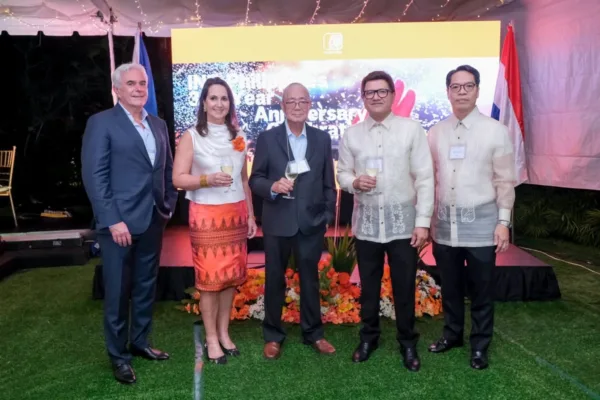PH revolutionizes connectivity through active public-private collaboration, bridging ASEAN, and extending its reach worldwide
As the ASEAN alliance focuses on digitally integrating its economy and society through its Digital Master Plan 2025, the terms “interoperability” and “integration” have again emerged as the top agenda.
This was revealed during a media briefing held recently dubbed, “The Philippines as a Digital Bridgeway to ASEAN and the World,” with no less than Ambassador Hjayceelyn Quintana, Permanent Representative of the Republic of the Philippines to ASEAN, gracing the occasion.
In her keynote speech, Amb. Quintana talked about the importance of driving digital transformation, which she said will be an important step for the country to enhance its participation in the region’s evolving digital economy. “There was a leader statement supporting the digital economy, and what it entails is more on interoperability and integration – not so much on removal of trade barriers, but more on interoperability,” she said.

The symbolic ASEAN handshake signifies the full support of the ASEAN Secretariat via its representative, the Office of the Permanent Mission of PH to ASEAN, as Digital Pilipinas has been formally appointed and recognized as its partner for championing digital economies and digital transformation.
As for the Philippines’ push to be the digital Bridgeway to ASEAN and the rest of the world, Quintana also acknowledged that all ASEAN countries are free to pursue their agendas while emphasizing the competitive advantage that the Philippines has when it comes to digital transformation.
That said, the Philippines may now be considered ready to take on its place as a digital bridgeway between ASEAN and the world, with Digital Pilipinas and the Permanent Mission of the Philippines to ASEAN formalizing a partnership recently.
Such partnership is expected to bring forth a variety of programs and transformative changes with fellow ASEAN member nations and different global trade missions and activities that are all looking at the ASEAN region as the new epicenter of growth.
At the forefront of this nationwide transformation are Digital Pilipinas Festival and the Philippine Fintech Festival (now in its second year), the largest twin Digital Economies Festival in the country that aims to bring together the ASEAN and the world into a week-long immersion from October 2 to October 5 at the SMX Aura, Taguig City. Its theme, AiSEAN (AI+ ASEAN), will focus on frontier technologies represented by AI as the great equalizer of the era and put the ASEAN region in the spotlight as it is projected to become the world’s largest single market by 2030.
Both festivals are expected to provide immersion activities with leading brands, government regulators, country partners, technologists, and the startup ecosystem of investors and founders. To know more about Digital Pilipinas and the Philippine Fintech Festival Year 2, check out https://digitalpilipinas.ph.
Promoting PH and its strengths in the digital economy
As part of this new partnership, Quintana’s office will now be collaborating with Digital Pilipinas in promoting the Philippines and its strengths in this sector. Digital Pilipinas is the largest private sector-led movement for creating an innovation and technology ecosystem in the country that is now actively engaged in a global digital economy.
“In the ASEAN, we have this ‘ASEAN Outlook in the Indo-Pacific’ — so this represents a good opportunity for us because it comprises about 60% of the GDP of the world and also half of the world’s trade,” the ambassador said. “If we show our strength in this particular sector, I think the opportunities will be so vast. And because this region is where technology hubs are concentrated at the moment, then I think there is so much that we can do,” she added.
For her part, Amor Maclang, convenor of Digital Pilipinas and also the lead organizer of the Philippine Fintech Festival, noted that the country’s superpower is its impressive mass adoption of digitalization, which has helped make the Philippines become the fastest-growing e-commerce and startup investment market in the world.
Supporting this assertion is the fact that Filipinos now rank second in the world and first in Asia in terms of having the most time spent on the Internet, even surpassing the global average by 99 minutes as stated in a report by Foxmont Capital Partners.
The same report states that funds raised by Philippine startups in 2022 exceeded US$1 billion for the second year in a row. Helped by a young, well-educated, digitally savvy, and growing middle class, this makes the country a large, attractive market that could now be ripe for investments.
Each member nation is formidable in digital economies
For a long time now, the Philippines has been positioning itself as a digital Bridgeway between ASEAN and the world, with significant investments in infrastructure and a robust digital landscape.
According to Maclang, presenting the Philippines as a digital Bridgeway to ASEAN is not tantamount to diminishing the tight work in promoting ASEAN overall. Rather, she said that each member nation is formidable in digital economies.
“As a Digital Bridgeway to ASEAN, we advocate for the Philippines to complement and work closely with other highly and equally digital partners and neighbors. For example, Indonesia, which is tech-ing up its transport system; Thailand and its progressive and advanced approach towards digital assets; Malaysia and its Insurance & Public Health project; and of course, Singapore, which has already created a new epicenter of digital financial power in the world for all of us,” she said.
To further spur this move, the Philippine government, through the Department of Information and Communications Technology (DICT) led by Secretary Ivan Uy, has recently launched the eGOV PH super app, which aims to streamline all government transactions and boost President Marcos, Jr.’s, digitalization efforts in bureaucracy.
This order from the President is in line with emphasizing digitalization’s relevance in consistently improving the “ease of doing business” in the Philippines. This is further aided by the establishment of the National Government Data Center and the Free Wi-Fi for All program, among others.







